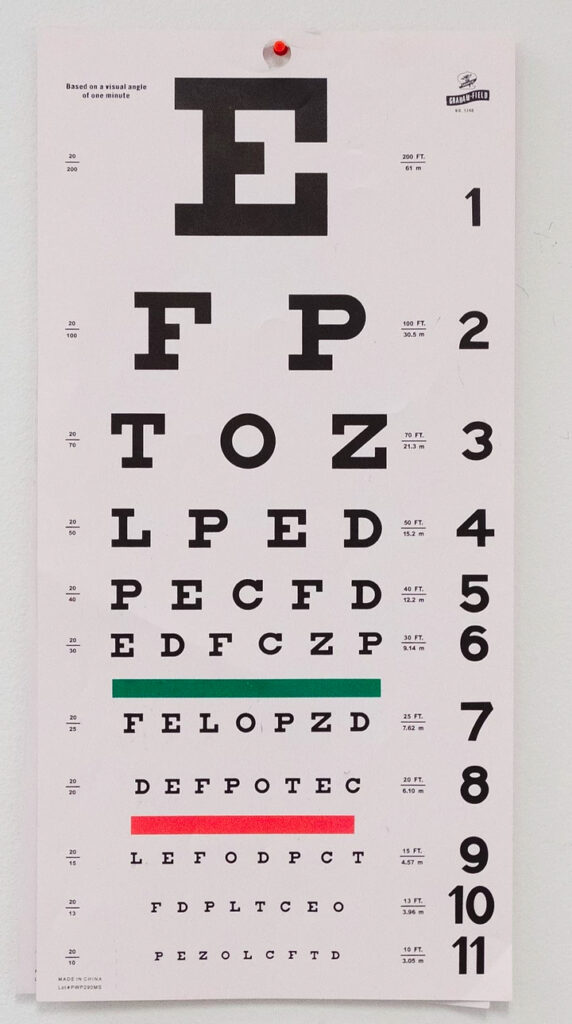My parents took me every year to get my eyes examined from the age of 6. Like many Americans, I have worn glasses, contacts, and had laser eye surgery to make fuzzy hands come into focus giving meaning to the world around me. I know how debilitating vision can be to my conversations and relationships with people, so I try to give everyone the tools needed for 20/20 vision.

One way I’ve done this is by doing eye exams for individuals in the state penitentiary. A member of my staff asked why I do this service. The reason, I explained, is because there is a strong correlation between criminal troubles and uncorrected vision problems.
The most recent patient I evaluated saw 20/400 on my acuity chart. That is legally blind by all standards. This particular individual had not worn glasses for more than 4 years. Often many adult individuals who were considered “at-risk” as children have not had an eye exam or glasses since childhood. Now imagine hanging with unsavory friends who make bad decisions and placing yourself in less than ideal situations when you are legally blind and can barely see your hand in front of you. Your reality, your reaction, your behavior is not surprisingly “fight or flight.”
My exam may make a minimal difference at this stage in life for a person behind bars. This story is, however, a learning moment for parents, educators, and lawmakers who aren’t aware of the vital need for school age children to have visual tools to make good choices and have the opportunity to thrive in society.
According to the non-profit Prevent Blindness, 1 in 4 students have a correctable refractive error that is untreated. A newer screening in Oregon addressed a scarier issue outside of schools. From 2002 to 2004, the National Children’s Vision Foundation conducted screenings on 361 students enrolled in an “at risk” program who had dropped out of high school or were failing in school. They found 34% had uncorrected vision problems. In addition, the same foundation screened 472 youths at the Deschutes County Juvenile Detention center and found 74% had vision problems. These numbers strike home the strong correlation of uncorrected vision problems and behavioral, academic, and even criminal activity. When national research reflects that 7 out of 10 juvenile delinquents have a vision related problem and 90% of inmates fail eye exams, we should not be surprised here in Nebraska reflects these national studies.
I have done school screenings and worked with pediatricians across eleven states. While many children may have 20/20 eyesight, what is often overlooked is the additional skills such as quickly moving eyes across a page, focusing at near, moving eyes quickly from near books to far smart boards, and integrating images. Distance testing is often the only test done and near testing is not done regularly.
There has been a 64% increase of people using antidepressants between 1999 and 2014 according to the American Psychological Association. The 2016 National Survey of Children’s Health reported 2 out of 3 children were taking medication for ADHD. Focusing skills can be disrupted anytime of year when a child is started on depressants, anxiety medication, and even ADHD medication.
I’m not going to cite the economic costs to a community when vision disorders go untreated like so many other blogs do. The loss of one life behind bars, in a detention or behavior center, or worse to suicide is far greater. The life long struggle for income and work for an individual is far greater.
As a child that has experienced vision problems, and more importantly as a doctor who has watched children struggle to keep up with their classmates, hide under desks, and battle suicidal thoughts because they are struggling with vision problems; I know the obstacles uncorrected vision can create.
I also know firsthand, that for many, treatment can be the difference between good decisions and bad decisions. Can you see clearly now? If you would like to be a part of the solution for “at-risk” children contact Beyond Vision LNK. We would be happy to share our Kottas program with you and discuss how we can work together to help others see the good life.
Dr. Carla Ericksen
Beyond Vision LNK
